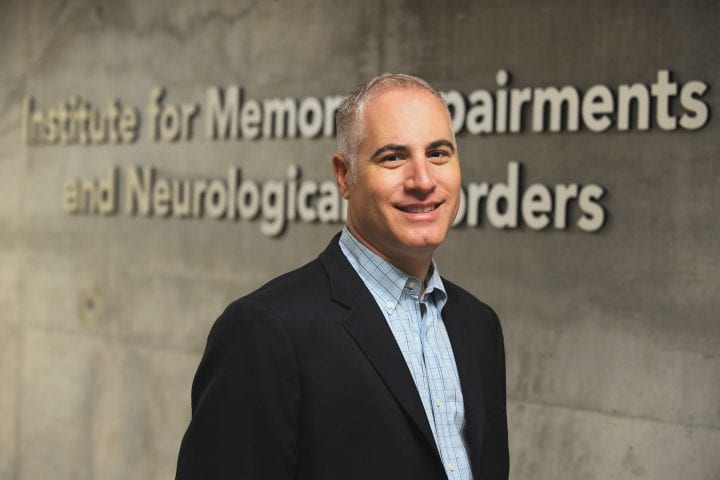Committed to memory
UCI MIND will host the 24th annual Southern California Alzheimer’s Disease Research Conference on Sept. 20.

As record numbers of Americans reach retirement, finding effective ways to prevent and treat Alzheimer’s disease – the No. 1 age-related disorder – becomes increasingly important. In Orange County, UC Irvine’s Institute for Memory Impairments and Neurological Disorders leads the way in Alzheimer’s research and education.
Each year, UCI MIND hosts one of the field’s most influential events, the Southern California Alzheimer’s Disease Research Conference, which features speakers and presentations showcasing the latest breakthroughs. The 2013 conference will be held Friday, Sept. 20, at the Hilton Orange County/Costa Mesa.
Frank LaFerla, UCI MIND director and Chancellor’s Professor and chair of neurobiology & behavior, helped organize the event. For more than a decade, he and his collaborators have made seminal discoveries about the mechanisms of Alzheimer’s and how to limit associated memory decline. Here, LaFerla discusses current research and treatments and what we can expect in the future.
Q: This is the 24th annual Southern California Alzheimer’s Disease Research Conference, making it one of the more established scientific meetings of its kind. How has the conference progressed over the years, and what excites you about it this year?
A: The event has evolved considerably. This year, participants can attend lectures based on their individual interests. For example, there will be a clinical track, geared more for practitioners, and a track to hear the latest research. The 2013 conference will take place the day before Alzheimer’s Action Day and brings together internationally renowned speakers who will present their findings as the U.S. races to halt the Alzheimer’s tsunami. The theme of this year’s event is “Countdown to 2025,” the year by which Congress and the president hope to end Alzheimer’s disease.
Q: What is the national plan to address Alzheimer’s disease? Will current sequestration harm this plan?
A: As of 2013, there are no drugs or therapies to definitively prevent, treat or cure Alzheimer’s. We need to marshal our resources to battle this disease in much the same way as was done for cancer. The war on cancer began with the signing of the National Cancer Act of 1971 by President Nixon. I believe historians will eventually record that the war on Alzheimer’s disease began with the January 2011 signing of the National Alzheimer’s Project Act by President Obama. Now, more than two years later, the first National Alzheimer’s Plan has been released, and the president’s fiscal 2013 budget proposal includes $100 million in additional funding for Alzheimer’s research, education and awareness, outreach and caregiver support. This is certainly a step in the right direction, but it’s still woefully inadequate, as a new case of Alzheimer’s disease develops every 68 seconds in the U.S. And sequestration is definitely slowing the pace of research against Alzheimer’s and other neurological disorders.
Q: How can sequestration affect research at UCI MIND?
A: Because of budget constraints at the National Institutes of Health, there has been a significant decrease in the number of grant applications that receive funding. Also, the budgets for funded projects have been slashed, and the length of the funding period is often reduced. Hence, researchers who receive funding are getting less of it, and those who lose funding simply have to shut down and lay off their personnel. This is a particularly difficult time for early-career investigators, because they are competing with senior investigators for the same pot of money. In addition, because American universities depend on graduate students funded by NIH research grants, there will be a progressive decline in the number of students trained in the sciences. I am really concerned about the future of American biomedical research and the talented young investigators who are suffering in the current funding environment. The unequaled, great American strength, biomedical research, is under such severe attack due to budget battles in Congress that new scientists are discouraged from entering the field.
Q: There has been a lot of recent news about unsuccessful clinical trials on drug treatments for Alzheimer’s. What can we learn from these trials, and how will they influence research at UCI MIND?
A: Several of us recently returned from the 11th International Conference on Alzheimer’s & Parkinson’s Diseases in Florence, Italy, where we heard the shocking news that there have been 103 clinical trial failures for Alzheimer’s disease. This point underscores the fact that we need more science now, not less. I believe Alzheimer’s research is entering a new era as we realize that this is not a simple disease to treat with just a single drug. We now appreciate the need to develop interventions based on specific disease mechanisms and exciting new advances such as stem cells, which allow us to repair the damaged brain.
Q: What promising work is going on right now at UCI MIND?
A: We are leading efforts to create new animal models – such as a sporadic mouse model – to facilitate better strategies to prevent Alzheimer’s in people as they age. The translational impact of this work is high and quite significant, because by successfully generating a model of sporadic Alzheimer’s, we will be able to identify and study the factors and conditions that trigger the disease in 98 percent of patients. With this knowledge, we can develop preventative strategies – much in the same way that heart disease can be prevented by lifestyle management and certain drugs, such as statins.
Because we do not yet fully understand the factors that initiate sporadic Alzheimer’s, the field has largely relied on models of the genetic version of this disorder. In general, these models have advanced the field and provided invaluable insights into disease pathogenesis. But now – especially in light of the recent disappointing clinical trial results – there is an urgent need to develop a mouse model of Alzheimer’s that more accurately mimics the sporadic version, including the effect that aging has on the disease process.
Q: You and fellow UC Irvine scientist Mathew Blurton-Jones have teamed with Stem Cells Inc. in a California Institute for Regenerative Medicine-funded effort to establish a stem cell-based therapy that can move into early-stage clinical trials. How is that progressing, and what’s exciting about it?
A: Stem cell therapy receives considerable attention, particularly since UCI MIND investigators have pioneered this avenue of research specifically for Alzheimer’s disease. We’re excited because our data show for the first time that stem cell transplantation can improve learning and memory in Alzheimer’s models, and it does so by promoting the health and survival of neurons in the damaged brain, allowing them to form new connections. Alzheimer’s is a degenerative disease, causing the brain to deteriorate over time. The opposite of degeneration is regeneration, and stem cells represent a regenerative therapy.


